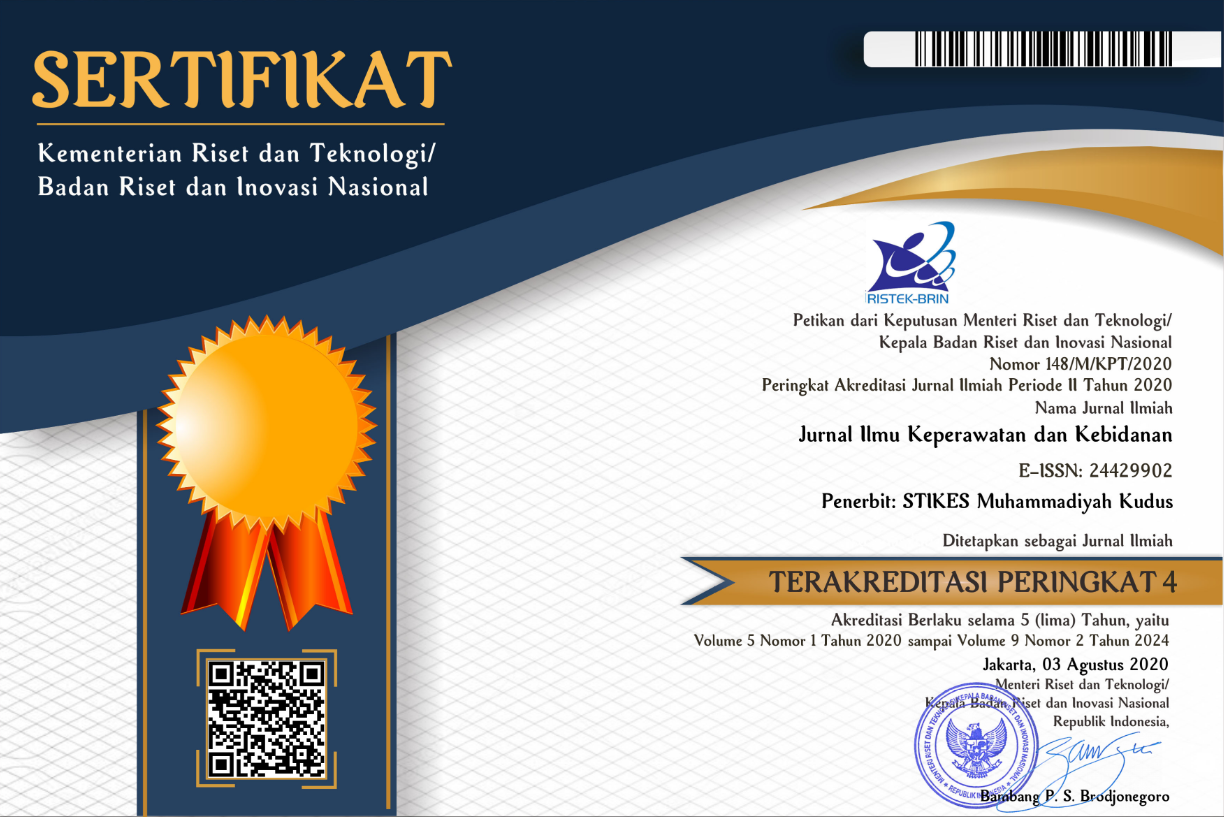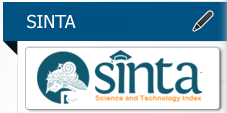PENGARUH PEMBERIAN TERAPI DZIKIR TERHADAP PENURUNAN TINGKAT KECEMASAN PADA PASIEN POST SC
Abstract
Abstrak
Latar belakang:Di Indonesia dalam Riset Kesehatan Dasar tahun 2013 proporsi persalinan dengan bedah sesar menunjukkan sebesar 9,8% Provinsi Jawa Tengah sendiri untuk metode persalinan Caesar sebesar 10%. Bedah caesar merupakan bedah yang bukan tanpa resiko, risiko dari bedah Caesar ini merupakan potensi stressor yang dapat menyebabkan pasien operasi SC mengalami kecemasan. Dunia kesehatan Islam, memasukkan dzikir sebagai salah satu upaya untuk mengatasi kecemasan. Tujuan: mengetahui pengaruh pemberian terapi dzikir terhadap penurunan tingkat kecemasan pada pasien post SC. Metode: Penelitian ini menggunakan quasy experiment dengan desain pre-post test design with control group. Sampel sebanyak 24 orang yang diambil secara sampel jenuh. Statistik yang digunakan adalah paired t test, wilcoxon test dan independent t test. Hasil uji Paired t Test diperoleh ada perbedaan (perubahan) tingkat kecemasan pasien post SC sebelum dan sesudah diberikan terapi dzikir pada kelompok intervensi nilai p = 0,000 > α = 0,05, terjadi penurunan rata-rata sebesar 9,917. Hasil uji Wilcoxon diperoleh tidak ada perbedaan (perubahan) tingkat kecemasan pasien post SC sebelum dan sesudah diberikan komunikasi terapeutik pada kelompok kontrol nilai p = 0,636 > α = 0,05, penurunan yang terjadi yaitu hanya 0,83. Hasil uji Independent t Test diperoleh tidak ada perbedaan (perubahan) tingkat kecemasan pasien post SC sebelum dan sesudah diberikan perlakuan pada kelompok intervensi dan kelompok kontrol dengan nilai p = 0,211 > α = 0,05. Kesimpulan: ada pengaruh pemberian terapi dzikir terhadap penurunan tingkat kecemasan pasien post operasi SC
Kata kunci : Kecemasan, Post SC, Dzikir
Abstract
Background: In Indonesia in 2013 Basic Health Research the proportion of deliveries with cesarean section showed 9.8% of Central Java Province alone for the method of caesarean delivery by 10%. Caesarean section is a surgery that is not without risk, the risk of a C-section is a potential stressor that can cause SC surgery patients to experience anxiety. The world of Islamic health, incorporating dzikir as an effort to overcome anxiety. Objective: to determine the effect of dzikir therapy on reducing anxiety levels in post SC patients. Method: This study uses a quasy experiment with a pre-post test design with control group design. A sample of 24 people were taken in a saturated sample. The statistics used were paired t test, Wilcoxon test and independent t test. Results: Paired t Test results obtained there were differences (changes) in the anxiety level of post SC patients before and after given dzikir therapy in the intervention group the value of p = 0,000> α = 0.05, there was an average decrease of 9,917. The results of the Wilcoxon test obtained no difference (change) in the anxiety level of post SC patients before and after therapeutic communication in the control group p = 0.636> α = 0.05, the decrease that occurred was only 0.83. The results of the Independent t Test obtained no difference (change) in the anxiety level of post SC patients before and after treatment in the intervention group and the control group with a value of p = 0.211> α = 0.05. Conclusion: there is an effect of giving dzikir therapy to decrease anxiety level of postoperative SC patients
Keywords: Anxiety, Post SC, Dzikir
Full Text:
PDFDOI: https://doi.org/10.26751/jikk.v10i2.687
Refbacks
- There are currently no refbacks.
Universitas Muhammadiyah Kudus - LPPM Universitas Muhammadiyah Kudus
Jl. Ganesha 1 Purwosari Kudus 59316
Tel/ Fax +62-291-437218 Email : [email protected]
Jurnal Ilmu Keperawatan dan Kebidanan Indexed by:

This work is licensed under a Creative Commons Attribution-ShareAlike 4.0 International License.













